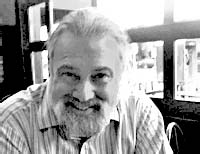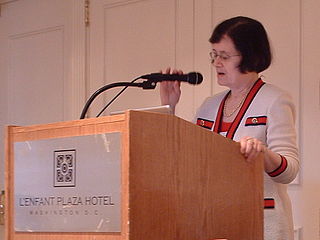
David Lee Chaum is an American computer scientist, cryptographer, and inventor. He is known as a pioneer in cryptography and privacy-preserving technologies, and widely recognized as the inventor of digital cash. His 1982 dissertation "Computer Systems Established, Maintained, and Trusted by Mutually Suspicious Groups" is the first known proposal for a blockchain protocol. Complete with the code to implement the protocol, Chaum's dissertation proposed all but one element of the blockchain later detailed in the Bitcoin whitepaper. He has been referred to as "the father of online anonymity", and "the godfather of cryptocurrency".
A voting machine is a machine used to record votes in an election without paper. The first voting machines were mechanical but it is increasingly more common to use electronic voting machines. Traditionally, a voting machine has been defined by its mechanism, and whether the system tallies votes at each voting location, or centrally. Voting machines should not be confused with tabulating machines, which count votes done by paper ballot.
Electronic voting is voting that uses electronic means to either aid or take care of casting and counting ballots.
Electoral fraud, sometimes referred to as election manipulation, voter fraud or vote rigging, involves illegal interference with the process of an election, either by increasing the vote share of a favored candidate, depressing the vote share of rival candidates, or both. It differs from but often goes hand-in-hand with voter suppression. What exactly constitutes electoral fraud varies from country to country.

The Help America Vote Act of 2002, or HAVA, is a United States federal law which passed in the House 357-48 and 92-2 in the Senate and was signed into law by President Bush on October 29, 2002. The bill was drafted in reaction to the controversy surrounding the 2000 U.S. presidential election, when almost two million ballots were disqualified because they registered multiple votes or no votes when run through vote-counting machines.

E-democracy, also known as digital democracy or Internet democracy, is the use of information and communication technology (ICT) in political and governance processes. The term is believed to have been coined by digital activist Steven Clift. E-democracy incorporates 21st-century information and communications technology to promote democracy; such technologies include civic technology and government technology. It is a form of government in which all adult citizens are presumed to be eligible to participate equally in the proposal, development and creation of laws.
Vote counting is the process of counting votes in an election. It can be done manually or by machines. In the United States, the compilation of election returns and validation of the outcome that forms the basis of the official results is called canvassing.

Barbara Bluestein Simons is an American computer scientist and the former president of the Association for Computing Machinery (ACM). She is a Ph.D. graduate of the University of California, Berkeley and spent her early career working as an IBM researcher. She is the founder and former co-chair of USACM, the ACM U.S. Public Policy Council. Her main areas of research are compiler optimization, scheduling theory and algorithm analysis and design.
An absentee ballot is a vote cast by someone who is unable or unwilling to attend the official polling station to which the voter is normally allocated. Methods include voting at a different location, postal voting, proxy voting and online voting. Increasing the ease of access to absentee ballots is seen by many as one way to improve voter turnout through convenience voting, though some countries require that a valid reason, such as infirmity or travel, be given before a voter can participate in an absentee ballot. Early voting overlaps with absentee voting. Early voting includes votes cast before the official election day(s), by mail, online or in-person at voting centers which are open for the purpose. Some places call early in-person voting a form of "absentee" voting, since voters are absent from the polling place on election day.

California's 8th congressional district is a congressional district in the U.S. state of California. As of 2021, Republican Jay Obernolte represents the district.
Electronic voting in Estonia gained popularity in 2001 with the "e-minded" coalition government. In 2005, Estonia became the first nation to hold legally binding general elections over the Internet with their pilot project for municipal elections.
End-to-end auditable or end-to-end voter verifiable (E2E) systems are voting systems with stringent integrity properties and strong tamper resistance. E2E systems often employ cryptographic methods to craft receipts that allow voters to verify that their votes were counted as cast, without revealing which candidates were voted for. As such, these systems are sometimes referred to as receipt-based systems.
Electronic voting by country varies and may include voting machines in polling places, centralized tallying of paper ballots, and internet voting. Many countries use centralized tallying. Some also use electronic voting machines in polling places. Very few use internet voting. Several countries have tried electronic approaches and stopped, because of difficulties or concerns about security and reliability.
Smartmatic or Smartmatic SGO Group is a multinational company that builds and implements electronic voting systems. The company also produces smart cities solutions, identity management systems for civil registration and authentication products for government applications.
The Electronic Frontier Foundation (EFF) is an international non-profit digital rights group based in San Francisco, California. The foundation was formed on 10 July 1990 by John Gilmore, John Perry Barlow and Mitch Kapor to promote Internet civil liberties.

General elections were held in Costa Rica on 3 February 2002. For the first time in the country's history, no candidate in the presidential election passed the 40% threshold. This meant a second round of voting had to be held on 7 April which saw Abel Pacheco of the Social Christian Unity Party defeat the National Liberation Party's Rolando Araya Monge.
Politics and technology encompasses concepts, mechanisms, personalities, efforts, and social movements that include, but are not necessarily limited to, the Internet and other information and communication technologies (ICTs). Scholars have begun to explore how internet technologies influence political communication and participation, especially in terms of what is known as the public sphere.
Biometric voter registration implicates using biometric technology, most of the times in addition to demographics of the voter, for polling registration and/or authentication. The enrollment infrastructure allows collecting and maintaining a database of the biometric templates for all voters.

Electronic voting in the United States involves several types of machines: touch screens for voters to mark choices, scanners to read paper ballots, scanners to verify signatures on envelopes of absentee ballots, and web servers to display tallies to the public. Aside from voting, there are also computer systems to maintain voter registrations and display these electoral rolls to polling place staff.

Aggelos Kiayias FRSE is a Greek cryptographer and computer scientist, currently a professor at the University of Edinburgh and the Chief Science Officer at Input Output Global, the company behind Cardano.







